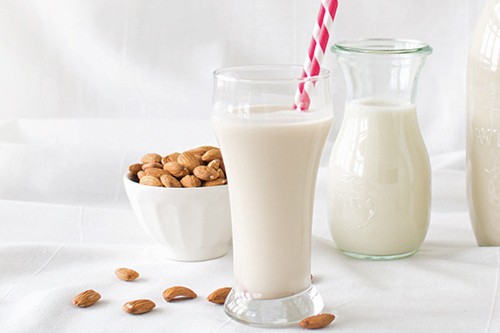
It's not just consumers motivated by vegan ethics, but also food intolerances, ethnic cultures and taste preferences supporting the rise of non-dairy beverages or alternatives — and consumption is skyrocketing across the board.
Blue Diamond, for example, recently reported that sales of almond beverages are growing at 80 percent annually. Meanwhile, consumption of milk is declining; according to a study released in May by the USDA's Economic Research Service, per capita fluid milk consumption has fallen from 0.96 cup-equivalents per day in 1970 to about 0.61 cup-equivalents per day.
Sharing the Shelf
Supermarket spaces once reserved exclusively for dairy products now include non-dairy alternatives, with refrigerated cartons of milk alternatives and non-dairy yogurts and cheeses found on refrigerated shelving. Some argue that non-dairy options should be presented alongside dairy as viable alternatives, while others say this move — and even the use of the term "milk" — confuses consumers.
Last year, three senators — Dan Coats (R-Ind.), Richard Lugar (R-Ind.) and Kirsten Gillibrand (D-N.Y.) — urged the U.S. Food and Drug Administration to crack down on use of the term "milk" when the product doesn't meet the legal standards of identity, including permitted ingredients and processing requirements. The U.S. National Milk Producers Federation backs the senators' campaign.
In a letter to the FDA dated May 25, 2012, the senators wrote that it has become increasingly commonplace to find products on the market that use the names of standardized dairy products (such as "milk," "cheese," "ice cream" and "yogurt") when the products don't contain dairy. "This practice unfairly allows non-dairy products to imply nutritional equivalence to dairy products and to potentially mislead consumers as to the true nutrient content or quality of these imitation products," states the letter.
Choosing Non-Dairy Milk
Just how similar are milk and non-dairy "milks?" That depends on the type of nondairy milk alternative. "Only soymilk has similar amounts of potassium as cow's milk, which may be important to help manage blood pressure," says Ruth Frechman, MA, RDN, CPT. "Rice milk tends to be the highest in carbohydrates, so it may be a concern for a person with diabetes."
"I like almond beverage to drink as is, but it is not as close nutritionally to dairy as soy beverage," says lifelong vegetarian Vandana Sheth, RDN, CDE. "For my clients who do not like the taste of soy and are not allergic to almonds, it is a good option."
People avoiding dairy should look for milk alternatives fortified with calcium, and vitamins D and B12.
Tips for incorporating non-dairy milk alternatives into a diet include:
- Substitute non-dairy milk cup-for-cup in recipes.
- Make non-dairy buttermilk by adding a tablespoon of vinegar or lemon juice to a cup of non-dairy beverage. Let it sit for a few minutes.
- Choose "unsweetened" or "plain" varieties of milk alternatives for savory dishes.
- Don't freeze non-dairy milk.
- Look out for carrageenan: Some people are sensitive to this seaweed-based thickener and stabilizer sometimes used in non-dairy beverages. Also be aware of added sugars.
- Shake non-dairy beverages before serving as some of the solids (and nutrients) settle at the bottom.
Six Non-Dairy Milk Alternatives
Almond
Often lower in calories and sugar than other milk alternatives, it is high in vitamin E and low in protein.
Soy
Thicker than other non-dairy milk alternatives, it has the most protein of non-dairy milks and is good as a creamer in coffee.
Coconut
Made of coconut "meat" blended with water. It has a higher fat content than other non-dairy milk alternatives and contains some saturated fat. Coconut beverage in a carton is best for drinking, while the canned version is richer and good for making curries.
Oat
Provides fiber and iron, but is low in protein. It contains phytochemicals, which may help prevent heart disease.
Hemp
Made of soaked hemp seeds ground with water and contains omega-3 fats. This milk alternative is good in baked goods because it doesn't have an obtrusive flavor.
Rice
Cholesterol-free and good for people with nut or soy allergies, but it is also low in protein and high in carbohydrates when compared to other non-dairy milks. It is generally the thinnest non-dairy milk.
